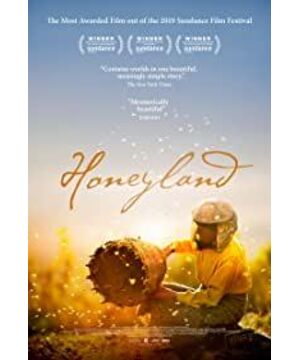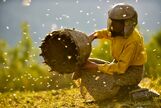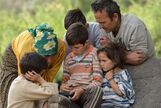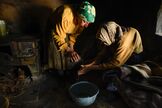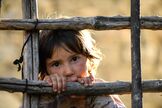The documentary won the Grand Jury Prize at the Sundance Film Festival World Documentary and was nominated for Best International Feature Film and Best Documentary at the Oscars. The entire creative team filmed in a small village in Macedonia for 3 years, saved 2,000 hours of material, and finally edited it into a 90-minute film, but the plot of the film is not complicated, simple and transparent, and even many segments are full of poetry.
This documentary was originally about the changes of the river to Macedonian villages, but when the beekeeper opened the hive and said, "I take half and leave half for the bees", this sentence inspired everyone's creative inspiration, and this film has always been with everyone. The message conveyed, "take half, keep half".
The protagonist of the story is the last female bee-picker in Europe, Kadis. She wears a bright yellow dress, like the color of wild honey on the cliff, in sharp contrast to the arid and barren scene of Macedonia. The half-blind mother lives with each other, feeding wild bees in the crevices of the stones. She can rejoice at a fan from the market, and be content with enough bananas to eat. Until the arrival of a nomadic family interrupted the peace of the village. Kadis has always longed to form her own family. The arrival of the children fulfilled her imagination. She played with them, taught them beekeeping, and shared everything with them. This family brought the products of the industrial assembly line, brought the fireworks, and brought endless desire.
Just like the devastating blow to nature brought about by the continuous expansion of human society, the family's desires are getting bigger and bigger. They ignore the rule of "Take half, keep half" of Kadis, ask the bees frantically, and drain it out. With the last drop of honey, the hungry bees attacked Cadiz's colony, Cadiz's bees all died, and then they began scavenging wild bees again. Soon, they ushered in natural revenge, the bees began to attack everywhere, and their own herds of cattle died in large numbers. Nature is so just that it can both give selflessly and severely criticize human greed. Sadly, the human beings in it, just like this family, are the greatest wealth. In order to support the family, they work hard and can't help themselves in the whirlpool of desires, and finally they can only leave this place angrily.
Humans are too smart, but always, smart enough to reap the consequences.
This last female beekeeper gave me far more shock and emotion than the phrase "take half, keep half". She never rejects her yearning for an industrial society, a radio can fill the gaps in her life, but she is out of the framework of the rules of the material society, perhaps this is the real "birth".
Due to language problems, the main creators can only judge the material through the original visual picture when editing, and then translate it after editing. The result is unexpectedly good, and some clips can even provide a poetic interpretation. Coming?" "Yes, because many winters have passed."
I am very fascinated by the unique texture of this documentary. When it is quiet, it is as old, elegant and solemn as an oil painting. The moving picture is so fresh and full of vitality. people infatuated.
When I stared at this face, staring at her like a miracle, I suddenly realized her loneliness and sadness, and I admired her perseverance and fearlessness. When I stared at this face, I was staring at her. own.
View more about Honeyland reviews


